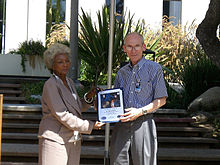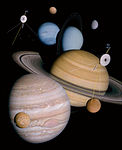Edward C. Stone
Edward C. Stone | |
|---|---|
 Stone with a Voyager model in 1992 | |
| Born | Edward Carroll Stone January 23, 1936 (age 83) Knoxville, Iowa, U.S. |
| Nationality | American |
| Alma mater | University of Chicago (M.S., Ph.D.) |
| Occupation | professor, physicist |
| Known for | JPL director and Voyager scientist |
Edward Carroll Stone (born January 23, 1936)[1] is an American space scientist, professor of physics at the California Institute of Technology, and former director of the NASA Jet Propulsion Laboratory (JPL).[2][3]
Biography[edit]
Stone was born in Knoxville, Iowa. After receiving his undergraduate education at Iowa's Burlington Junior College, Stone attended the University of Chicago where he earned his M.S. and Ph.D. degrees in physics. Stone's astrophysics career goes back to his first cosmic-ray experiments on Discoverer satellites in 1961. He then joined the staff of Caltech as a research fellow, and became a full faculty member in 1967.
He was named professor of physics in 1976, and was chair of the Division of Physics, Mathematics, and Astronomy from 1983 to 1988. He has also served as director of the Caltech Space Radiation Laboratory, and as vice president for Astronomical Facilities. He is currently the Morrisroe Professor of Physics[4] and the vice-chair of the Thirty Meter Telescope Board of Directors.[5]
As project scientist for the unmanned Voyager spacecraft missions to the outer Solar System since 1972, and a major spokesman for the Voyager science team, he became especially well known to the public in the 1980s. He has since been principal investigator on nine NASA spacecraft missions and coinvestigator on five more.
He was the P.I. for the Cosmic Ray System on the Voyager 1 and 2 spacecrafts, an experiment to measure cosmic rays.[6]
JPL director[edit]

Stone was the director of Jet Propulsion Laboratory in Pasadena, California from 1991 to 2001. During his tenure, the Mars Pathfinder and its Sojourner rover were successful. Other JPL missions in the period included Mars Global Surveyor, Deep Space 1, TOPEX/Poseidon, NASA Scatterometer (NSCAT)[7] and the launches of Cassini, Stardust, and 2001 Mars Odyssey.
Awards and honors[edit]
- Recipient of the 2007 Philip J. Klass Award for Lifetime Achievement
- Recipient of the 1999 Carl Sagan Memorial Award
- Member of the National Academy of Sciences
- Recipient of the 1991 National Medal of Science
- Recipient of the 1992 Magellanic Premium
- Recipient of the 2013 NASA Distinguished Public Service Medal
- Recipient of the 2014 Howard Hughes Memorial Award
References[edit]
- ^ "Edward Stone Biography". caltech.edu. Retrieved May 12, 2015.
- ^ Streeter, Kurt (April 14, 2011). "A new frontier in quest to understand the cosmos". Los Angeles Times. Retrieved April 14, 2011.
- ^ "Edward Stone Biography". nasa.gov. Archived from the original on May 27, 2010. Retrieved May 12, 2015.
- ^ "Edward Stone Profile". nasa.gov. Archived from the original on May 27, 2010. Retrieved May 12, 2015.
- ^ "TMT Board of Directors". Retrieved May 30, 2017.
- ^ "NASA - NSSDCA - Experiment - Details". nssdc.gsfc.nasa.gov. Retrieved May 30, 2017.
- ^ F. Naderi, M. H. Freilich, and D. G. Long, Spaceborne Radar Measurement of Wind Velocity Over the Ocean--An Overview of the NSCAT Scatterometer System, Proceedings of the IEEE, pp. 850-866, Vol. 79, No. 6, June 1991,
External links[edit]
- 1936 births
- Living people
- California Institute of Technology faculty
- National Medal of Science laureates
- Voyager program
- Members of the United States National Academy of Sciences
- People from Knoxville, Iowa
- 20th-century American physicists
- 21st-century physicists
- 21st-century American scientists
- Scientists from Iowa
- University of Chicago alumni
